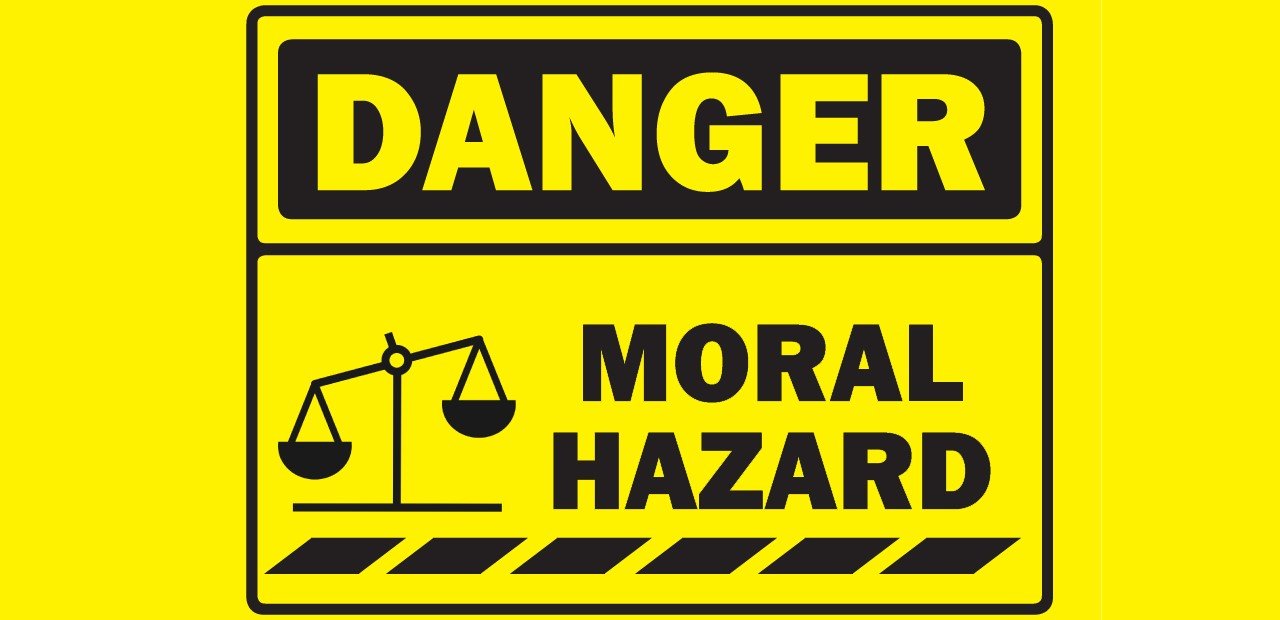

Feb
We usually come across the term “moral hazard” when discussing situations pertaining to the Western financial system, especially after the Great Recession of 2007-2008 (click HERE for an article through which we analyze its effects on China).
Perhaps the most textbook example revolves around the morally corrupt bonus mechanism bankers had. On the one hand, their bonuses were directly proportional (enough) to the amount of business they generated for the bank and on the other hand, they weren’t held personally responsible if things went wrong. Therein lies the moral hazard situation: you reap rewards if you are “right” and aren’t in any way punished if not.
This moral hazard situation was exacerbated by the fact that banks engaged in “innovative” banking, with them handing out loans to individuals or businesses, then packaging them as financial instruments (such as the infamous Mortgage-Backed Securities or MBS) and selling them to investors through financial markets. As such, the bank went from “traditional” relationships where a loan was handed out and payments were collected over a period of decades to relationships which involved loans being handed out and passed on as hot potatoes to various investors later on, with the bank washing its hands of them.
Needless to say, incentives to be prudent when handing out loans didn’t exactly abound.
To make matters worse, when things went sour, the banking system in particular and financial system in general had to be bailed out by taxpayers, making the moral hazard dilemma that much worse. From banks to insurance companies such as AIG, examples of moral hazard-facilitated reckless behavior abound.
What about China?
As tends to frequently be the case, it isn’t difficult to find common denominators when comparing China to the proverbial West, even if we do not have perfect symmetry. The incentive structure is different in China, the financial system has its own particularities and so on. But while the “packaging” is indeed different, moral hazard situations aren’t the least bit difficult to come across if we simply… well, follow the money.
It’s ultimately all a matter of asking a few well-placed questions in the right succession:
- Are there instances in which money can be made in China through methods one can consider reckless? Anything from methods involving excessive debt to methods involving a wide range of externalities?
- If so, is there a proverbial privileged class that is on the receiving end of the benefits, with an incentive structure (either by design or circumstantial) which enables them to do well when times are good and land on their feet without facing (all that dire) consequences if things end badly?
- Will the proverbial bill end up having to be covered by third parties that weren’t directly involved in the shenanigans?
- What about the authorities, are they acknowledging the existence of a problem or minimizing everything, even denying that causes for concern exist?
If the answers to the first three questions are yes when it comes to a certain situation/industry in China, whereas the answer to the last one is negative, we have what can be considered a textbook moral hazard situation on our hands.
Let’s face it:
- Is it really all that difficult to identify examples of recklessness in China? For example situations involving less than sophisticated entities (individuals, companies, or both) that aren’t exactly experts at juggling debt but were able to receive loans far too easily, loans they once again weren’t that experienced in leveraging? Of course not. The same way, is it that difficult to identify situations in which in the spirit of economic growth (even if at all costs), potentially devastating externalities were overlooked? Once again, no
- For a nation run by a party with a let’s call it Marxist-Leninist perspective politically-speaking, it sure is easy to come across individuals with quickly-acquired fortunes in China. All it takes is a little bit of digging and in quite a few situations, those gains (perhaps not demonstrably ill-gotten but certainly questionable from a moral hazard perspective) can be traced back to a reckless incentive/disincentive framework
- While there have been instances in which the Chinese authorities have proven less than willing to bail out an entity, it is for the most part expected that if things truly get dire (especially when, as was the case with the Great Recession, the risk is considered systemically relevant), the Chinese government will act as a creditor of last resort, with the “Who foots the bill?” implications which naturally/logically follow
- While the authorities have gradually adopted a more vocal stance against anything from corruption to immoral behavior (especially when it comes to the Xi Jinping administration, with the behavior of those with official decision-making privileges being more than obviously in the proverbial spotlight), public discourse is oftentimes little more than hot air. While the occasional head does fall, perhaps in an effort to set an example, let’s just say the journey from official statements to enforcing policy on a local/granular level is more than challenging
As can be seen, moral hazard situations are anything but absent in China, they are simply… as is the case with many other politico-economic aspects, different. Believing that China is somehow immune to basic human folly and that an endogenous Great Recession-type situation cannot possibly occur is an attitude one can consider optimistic at best and reckless at worst. A fairly straightforward conclusion can therefore only be this: while (in our case economic) history doesn’t repeat itself, it most definitely rhymes and common denominators are remarkably easy to identify.
